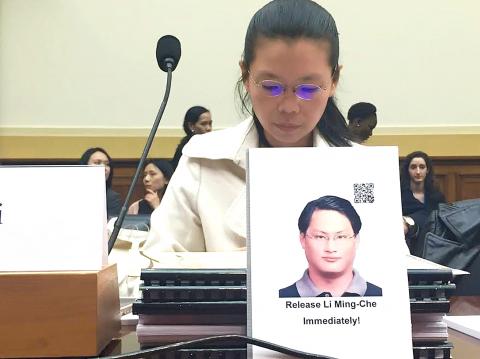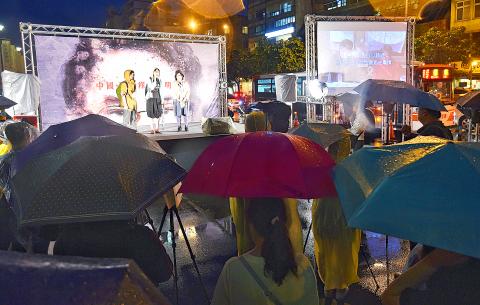Human rights groups yesterday gathered at the Liberty Square in Taipei, demanding that China immediately release Taiwanese human rights advocate Lee Ming-che (李明哲).
Lee was detained after entering Zhuhai City via Macau on March 19. He used to work for the Democratic Progressive Party and is currently a staff member at Wenshan Community College in Taipei, as well as a volunteer at the non-governmental organization Covenant Watch.
“We hope he will return soon,” Taipei Wenshan Community College president Cheng Hsiu-chuan (鄭秀娟) said.

Photo: courtesy of Shih Mi-na
The rally last night also sought to raise public awareness about forced disappearances.
“Lee’s wife, Lee Ching-yu [李凈瑜], declined the offer of help from human rights lawyers, because she believes her husband’s forced disappearance is an issue of human rights rather than a legal issue,” Cheng said. “There cannot not be any gray area between the two.”
Cheng said that people often joke that China has “held many Taiwanese hostages,” because of the large number of Taiwanese conducting business there, but she believes the nation would find a way to resolve the case without sacrificing its dignity.

Photo: Liu Hsin-de, Taipei Times
Taiwan Association for Human Rights secretary-general Chiu Ee-ling (邱伊翎) said that Beijing should clarify on what grounds it detained Lee Ming-che.
Even if China arrested Lee Ming-che according to the Law of the People’s Republic of China on the Administration of Activities of Overseas Non-Governmental Organizations within the Territory of China, Chinese authorities should not have detained him for more than 37 days, Chiu said.
Lee Ming-che had been detained for 61 days as of yesterday.
The 5 million Taiwanese visiting China each year must not turn a blind eye to the incident; otherwise, they would be acquiescing to China’s atrocities, which have not only infringed on the freedom of Taiwanese, but of international human rights advocates and academics, she added.
Covenant Watch chief executive officer Huang Yi-bee (黃怡碧) said her organization has sent a letter to German international law expert Eibe Riedel, who serves as a consultant for the German Commission for UNESCO, informing him of Lee Ming-che’s situation.
Riedel has forwarded the letter to the commission and 40 UNESCO ambassadors, Huang said, expressing the hope that UNESCO would use its influence to press China to release Lee Ming-che.
Meanwhile, Lee Ching-yu appeared on Thursday before a US House of Representatives committee hearing in Washington to appeal for help to secure her husband’s release.
She also pleaded for Washington to help preserve and enhance the human rights of Taiwanese in accordance with the Taiwan Relations Act (TRA).
Lee Ching-yu attended the hearing on forced disappearance, detention and torture in China along with the wives of three Chinese human rights lawyers who have also been detained.
Lee Ching-yu said in a statement that she had no choice but to seek help from the US, a country she described as “the leading democracy in the free world.”
“The US Congress has also voluntarily taken on the responsibility, as specified in section 2, clause 3 of the Taiwan Relations Act, to preserve and enhance the human rights of the people of Taiwan,” she said.
“Therefore, I stand alone before you today to plead for your help for my husband,” she said.
US Representative Chris Smith, who chaired the hearing of the subcommittee on global human rights, said Taiwan is an important democratic ally of the US, and a beacon of peace and democracy in Asia.
The US should continue its promises stated in the TRA and “six assurances,” which are the fundamental basis of Taiwan-US relations, he said.
After the hearing, Lee Ching-yu told reporters that she did not expect her husband to be released because of the hearing, but that being a human rights worker, one must believe in certain values and work hard to see them realized.
She said that as long as her husband remains in detention, she would do everything in her power to secure his release.

Right-wing political scientist Laura Fernandez on Sunday won Costa Rica’s presidential election by a landslide, after promising to crack down on rising violence linked to the cocaine trade. Fernandez’s nearest rival, economist Alvaro Ramos, conceded defeat as results showed the ruling party far exceeding the threshold of 40 percent needed to avoid a runoff. With 94 percent of polling stations counted, the political heir of outgoing Costa Rican President Rodrigo Chaves had captured 48.3 percent of the vote compared with Ramos’ 33.4 percent, the Supreme Electoral Tribunal said. As soon as the first results were announced, members of Fernandez’s Sovereign People’s Party

EMERGING FIELDS: The Chinese president said that the two countries would explore cooperation in green technology, the digital economy and artificial intelligence Chinese President Xi Jinping (習近平) yesterday called for an “equal and orderly multipolar world” in the face of “unilateral bullying,” in an apparent jab at the US. Xi was speaking during talks in Beijing with Uruguayan President Yamandu Orsi, the first South American leader to visit China since US special forces captured then-Venezuelan president Nicolas Maduro last month — an operation that Beijing condemned as a violation of sovereignty. Orsi follows a slew of leaders to have visited China seeking to boost ties with the world’s second-largest economy to hedge against US President Donald Trump’s increasingly unpredictable administration. “The international situation is fraught

MORE RESPONSIBILITY: Draftees would be expected to fight alongside professional soldiers, likely requiring the transformation of some training brigades into combat units The armed forces are to start incorporating new conscripts into combined arms brigades this year to enhance combat readiness, the Executive Yuan’s latest policy report said. The new policy would affect Taiwanese men entering the military for their compulsory service, which was extended to one year under reforms by then-president Tsai Ing-wen (蔡英文) in 2022. The conscripts would be trained to operate machine guns, uncrewed aerial vehicles, anti-tank guided missile launchers and Stinger air defense systems, the report said, adding that the basic training would be lengthened to eight weeks. After basic training, conscripts would be sorted into infantry battalions that would take

GROWING AMBITIONS: The scale and tempo of the operations show that the Strait has become the core theater for China to expand its security interests, the report said Chinese military aircraft incursions around Taiwan have surged nearly 15-fold over the past five years, according to a report released yesterday by the Democratic Progressive Party’s (DPP) Department of China Affairs. Sorties in the Taiwan Strait were previously irregular, totaling 380 in 2020, but have since evolved into routine operations, the report showed. “This demonstrates that the Taiwan Strait has become both the starting point and testing ground for Beijing’s expansionist ambitions,” it said. Driven by military expansionism, China is systematically pursuing actions aimed at altering the regional “status quo,” the department said, adding that Taiwan represents the most critical link in China’s